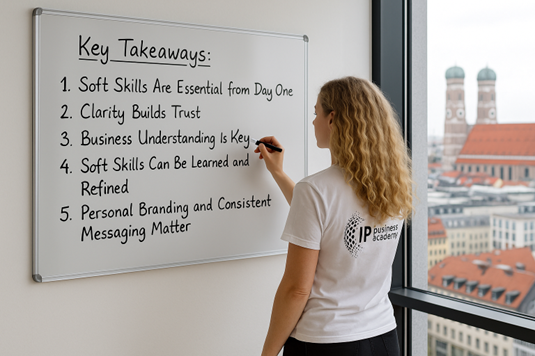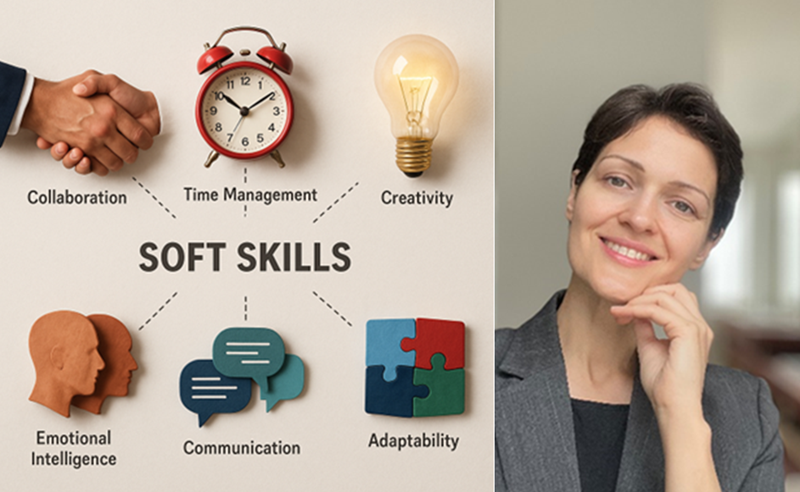The Soft Side of IP: Soft Skills are the Hardest Asset in IP – Interview with Maria Boicova-Wynants
In the fast-paced world of intellectual property (IP), technical mastery often takes center stage. Patents, trademarks, litigation strategies, and licensing contracts dominate the discourse. Yet, amid this complex web of legal and commercial challenges, one set of skills is emerging as equally—if not more—important than the technical know-how: soft skills.
This was the central message of a thought-provoking conversation featured on the CEIPI IP Business Talks, where Maria Boicova-Wynants, an IP strategist, author, and self-proclaimed “IP translator,” shared her views on the growing importance of soft skills for IP professionals. Hosted live on LinkedIn by the IP Business Academy, this discussion served as a prelude to the upcoming conference in Strasbourg that features both a “hard track” and—for the first time—a “soft track” focused on personal development.
Here are the key insights from this rich and reflective interview, and why soft skills might just be the hardest and most valuable assets in the IP toolkit.
From “Know-How” to Know-Who: Maria’s Journey Into IP
Maria’s journey into intellectual property began with a moment of serendipity—a high school thesis on “know-how.” What started as a curiosity transformed into a passion, leading her to law school, business education, and over two decades of hands-on IP practice. That blend of law and business shaped her unique perspective: IP professionals are not just guardians of legal rights; they are business enablers, communicators, and translators.
Maria’s dual lens—legal and business—exemplifies the very essence of the IP soft skill mindset: understanding the client, the industry, and the human motivations behind every file and contract.
IP Is a People’s Business
“If they don’t understand you, they don’t trust you. If they don’t trust you, they won’t work with you.”
Maria’s statement captures a simple truth that too often goes unnoticed: IP is a people’s business. Whether you are filing patents, drafting licensing agreements, or managing portfolios, your success depends on how well you understand and communicate with people. Clients, inventors, C-suite executives—they all speak different “languages,” and the IP professional must act as a translator.
In practical terms, this means:
- Practicing empathetic listening—understanding not just what is being said, but what is felt.
- Using clear, simple language instead of technical or legal jargon.
- Standing in the shoes of the client to better grasp their business needs, constraints, and fears.
Maria describes this not as “soft” but as “the hardest part” of the job. The complexity lies in simplicity—making the intangible understandable, the abstract actionable.
 The Double Hurdle: Selling IP Before Selling Yourself
The Double Hurdle: Selling IP Before Selling Yourself
Unlike accountants or engineers, IP professionals face a double challenge. First, they must convince clients that IP matters. Only then can they position themselves as the right professional to help.
Clients often see IP as abstract or irrelevant. They might care about outcomes like market access, brand reputation, or competitive advantage—but rarely do they ask for a perfect trademark clause. Maria emphasizes the importance of flipping the conversation: stop selling the tool (patents, trademarks) and start selling the benefit.
Soft skills like communication, persuasion, and storytelling become essential. You’re not just delivering services; you’re building understanding and trust, two cornerstones of lasting client relationships.
Start in Kindergarten: It’s Never Too Early for Soft Skills
Maria delivers a humorous but serious response when asked when one should begin developing soft skills: “Kindergarten.”
While hard skills are foundational—legal knowledge, technical expertise—they are no longer sufficient. Being a brilliant legal mind locked away in a corner office won’t cut it if you can’t communicate your value or build rapport with clients.
In fact, Maria argues that the earlier one cultivates soft skills, the better. Even junior professionals should begin practicing how to explain IP in clear terms, how to present themselves authentically, and how to engage with different stakeholders.
Clarity Is Power: The Communication Imperative
One recurring theme in the talk is clarity of message. In Maria’s view, this isn’t optional; it’s mission critical.
Clear communication is not only about being understood. It is also a tool for structuring your own thoughts. “If your message is clear,” she says, “your brain is clear.”
This is why Maria encourages IP professionals to:
- Rehearse how to explain complex concepts to non-experts.
- Analyze their own recorded presentations and reflect on areas for improvement.
- Develop a habit of simplifying—not oversimplifying—legal and technical content.
In this era of short attention spans and digital noise, the ability to be clear, concise, and compelling is not a luxury—it’s a necessity.
Adapting to the Digital Shift: From Solopreneurs to Personal Brands
The digitalization of professional communication has changed the game. From LinkedIn to YouTube, IP professionals now have the tools to build a personal brand—but are they using them effectively?
Maria warns against the “I’m at INTA, drinking a martini” style of posts, which add little value. Instead, she promotes a strategic, content-driven approach: understand your audience, identify their pain points, and consistently communicate how you can help.
Her mantra? Clarity + Consistency = Credibility.
When done right, digital communication helps potential clients understand who you are and what you stand for. It’s not about showing off; it’s about showing up—with value.
Core Soft Skills for IP Professionals
Maria outlines several must-have soft skills for IP professionals:
1 . Empathic Listening – Hear beyond words; listen for meaning and motivation.
2 . Clarity in Communication – Cut through the complexity and speak the client’s language.
3 . Negotiation and Mediation Skills – Reframe positions, uncover underlying interests, and guide towards resolution.
4 . Adaptability and Emotional Intelligence – Read the room, adjust your tone, and remain calm under pressure.
5 . Leadership and Team Dynamics – Even solo practitioners need to lead—clients, projects, or thought movements.
6 . Marketing and Personal Branding – Know your audience, tailor your message, and build long-term credibility.
Maria also recommends mediation training and feedback-based learning (like watching your own video presentations) as powerful tools for growth.
The Psychology of IP: Understanding Decision-Making Biases
At the upcoming CEIPI/I3PM conference in Strasbourg, Maria will dive deeper into the psychology of IP, exploring the biases that affect how decision-makers perceive intellectual property. From cognitive shortcuts to emotional filters, these biases can derail even the most logical argument.
Her soft track session will tackle:
- What psychological forces influence IP-related decisions?
- How can IP professionals navigate these forces through better communication?
- Practical examples and tools to reframe messages and increase persuasion.
It’s a session designed not just to inform but to empower—equipping attendees with insights they can immediately use in client meetings, boardrooms, and beyond.
A Thinking Partner: Coaching Beyond Coaching
Beyond public speaking and writing, Maria also acts as a “personal buddy” to professionals—supporting them through mentorship, strategic planning, and real-world role-playing. Her clients range from junior IP analysts to seasoned attorneys who need a sparring partner to refine their message or handle high-stakes negotiations.
It’s not coaching in the abstract. It’s thinking in partnership, a form of guided reflection and skill-building tailored to the messy, human side of IP practice.
Final Thoughts: It’s a Long Game—Start Now
Soft skills are not a bonus or a nice-to-have. In today’s competitive, complex, and digitally-driven world, they are the differentiators. They are what make you relatable, trustworthy, and ultimately successful.
Maria’s parting advice: start practicing now, even if you feel unprepared. “Start before you’re ready.” The more you practice explaining IP to others, the more fluent, adaptable, and valuable you become.
So whether you’re a solo patent attorney, in-house counsel, or a legal-tech innovator, remember: your value lies not only in what you know, but in how well you connect, communicate, and catalyze understanding.
🎓 Interested in more? Join Maria Boicova-Wynants and other thought leaders at the CEIPI/I3PM conference in Strasbourg on June 23, where the soft meets the hard in intellectual property.
For registration, details, and the full agenda, visit the event page.



